Reports of Past Events
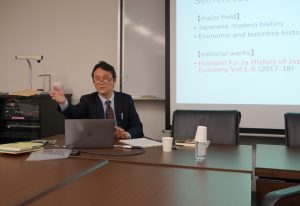
The 25th Tobunken-GJS Lecture “Diversification and Convergence: The Development of locomotive technology in Meiji Japan” was held
Report On January 19, 2018, Professor Naofumi Nakamura, Senior Associate Director of the Institute of Social Science at the University of Tokyo, gave a talk entitled "Diversification and Convergence: The Development of locomotive Technology in Meiji Japan" at the Global Japan Studies Lecture Series. The talk was chaired by Professor Shigeto Sonoda of the Institute for Advanced Studies on Asia. In his talk, Professor Nakamura traced the process of Japan's railway technology development which he divided into four stages and analyzed the characteristics of each stage. With various figures and graphs, his talk provided a clear picture of how Japanese locomotive and railway technology has evolved during the Meiji period
Global Japan Studies Special Event “The University of Chicago & The University of Tokyo Joint Graduate Workshop and Faculty Roundtable” was held
Report The University of Chicago and The University of Tokyo Joint Graduate Workshop and Faculty Roundtable were held on December 13 at Institute for Advanced Studies on Asia, the University of Tokyo. Gukchin SONG, Felix BORTHWICK, and KIZUKI Nagisa, all from the University of Tokyo, and FENG Naixi, KANAHARA Noriko, and Erin NEWTON, all from the University of Tokyo, gave presentations on their recent research projects. In the afternoon session entitled “Round Table: Three Perspectives on Japanese Studies,” Professor James KETELAAR from the University of Chicago, Professor SONODA Shigeto and Professor NAKAJIMA Takahiro from the University of Tokyo exchanged their views and expectations of Japanese studies in the future. Including
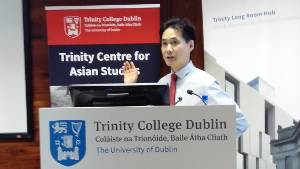
Associate Professor Yijiang Zhong Gave a Public Talk at Trinity College Dublin
On Sep. 18, Professor Yijiang Zhong gave a public talk titled “The Underside of Japan: Capitalism, Empire, and the Production of Space in Modern East Asia” at the Trinity Center for Asian Studies of Trinity College Dublin, the oldest and most prestigious university in Ireland. About 30 people came to the talk. The hour-long talk was followed by a lively 15-minute Q&A discussion.
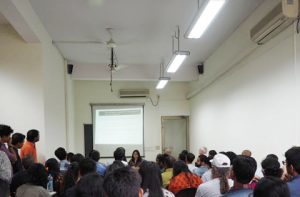
Dr Aya Ikegame gave a lecture at the University of Delhi
As a part of the U Tokyo team for the JAPAN HIGHER EDUCATION FAIR, Dr Aya Ikegame gave a lecture at the East Asian Studies Department of Delhi University on the 31st July, and at Miranda House College on the 1st August. Her lecture was titled ‘Untouchability Compared: Political experiences of Burakumin in Japan and Dalits (Adijans) in South India’ A couple of hundreds students and lecturers gathered to listen to her lecture.
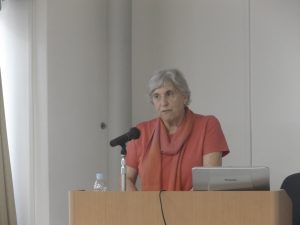
The 22nd Tobunken-GJS Lecture “The Japanese Studies in the Age of Globalization” was held
Report On June 14, 2017, Prof. Patricia Steinhoff, Professor and Chair, Department of Sociology, University of Hawaii at Manoa, gave a talk entitled “Japanese Studies in the Age of Globalization”. In her talk, Professor Steinhoff first gave an overview of the history and current situation of Japanese studies in the US and Canada, through introducing her participation in the Directory of Japanese Studies in the United States and Canada, the result of a series of surveys tracing the domestic growth and change in Japanese Studies in the United States and Canada from the late 1980s through 2016. Then she talked about how her long-term research on the Japanese New Left
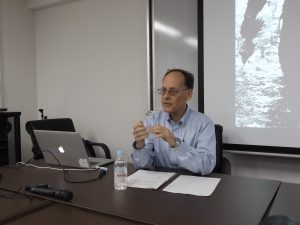
The 23rd Tobunken-GJS Lecture “Earth Photography from HAMAYA Hiroshi to NAKAHIRA Takuma” was held
Report June 15, 2017. Professor Bert Winther-Tamaki of the University of California at Irvine gave a talk entitled “Earth Photography from HAMAYA Hiroshi to NAKAHIRA Takuma” at the Global Japan Studies Network. Prof. Winther-Tamaki’s talk was chaired by Maromitsu Tsukamoto, associate professor of the Institute of Advanced Studies on Asia. Professor Bert Winther-Tamaki introduced an original framework of three themes, namely “Touch”, “Move”, and “burn”, to examine through comparison the phenomenon of earth presented in ceramics, photographs, and installation art. Many of the photographs being analyzed were works of Hiroshi Hayama and Takuma Nakahira, but Prof Winther-Tamaki also introduced many other art works related to the theme. The question and
The release of TOBUNKEN (Institute for Advanced Studies on Asia) original clear files
(Introduction by Original Designer) We are happy to announce the release of TOBUNKEN (Institute for Advanced Studies on Asia) original clear files. The designer, Keiko TSUJI (http://www.tsujikeiko.com), is known for her paper cutout art. Her work was featured in the opening image of the NHK morning drama series Toto Nee chan. Digital design was by Tomoko WATANABE. Keiko TSUJI picked up several artifacts from our archaeological collection. The oldest artifact is a cow shoulder bone with carved scripts. Humorous wooden statues are from Turpan, Xinjian region of China. The original TOBUNKEN clear files are available for sale at the COOP shop just behind the Yasuda Hall, Hongo Campus, the University
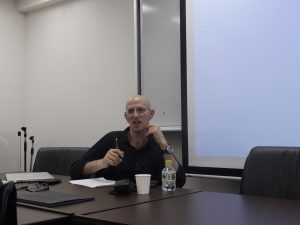
The 20th GJS Lecture was held “Repetition and Recovery: The Limits of Reason in Post 3.11 Japan”
Speaker: Michael Fisch (Professor, Department of Anthropology, University of Chicago Date and time: May. 15, 2017 (Mon.), 3:00-5:00PM Venue: 1st Meeting Room (3F), The Institute for Advanced Studies on Asia, University of Tokyo Language: English Report On May 15 2017, Professor Michael Fisch gave a talk entitled “Repetition and Recovery: The limits of Reason in Post 3.11 Japan.” In his talk, Professor Fisch focused on the ongoing construction of mammoth seawalls along the northeast Japanese sea coast and analyzed how this was developed as an alternative to protect against tsunami. He further explored to what extent these seawalls have changed local environment and the how they have been received by
The 14th GJS Lecture Series “When Honesty Ceased to be the Best Policy: Foundation of Political Rhetoric of Meiji Japan”
Report The 14th GJS lecture was held at IASA on Octover 6th, 2016. Professor Iokibe Kaoru delivered a lecture about Japanese people\’s perception about politics and its transformation from Meiji to today, focusing on its reflection in journalism such as political satire and the dispute over election reform, and shed light to Japan\’s ideocyncratic political culture. Information Title: When Honesty Ceased to be the Best Policy: Foundation of Political Rhetoric of Meiji Japan Speaker: Iokibe Kaoru (Professor, Graduate School of Law and Politics, The Universiry of Tokyo) Date and time: Octover 6 (Thur.), 4:00-6:00PM Venue: Main Conference Room (3F), Institute for Advanced Studies on Asia, University of Tokyo Language: English
The 18th GJS Lecture (Co-organized by IASA and ASNET) “One More Defense of History: Confronting the Phenomenon of Mutual Aversion in East Asia and the Discourse of the Empire”
Report The 18th GJS lecture was held at IASA on February 4th, 2017. Professor Baik Young-seo delivered a lecture on his recently-published book. For detailed information, please see Japanese page. Information Title: One More Defense of History: Confronting the Phenomenon of Mutual Aversion in East Asia and the Discourse of the Empire Speaker: Baik Young-seo (Professor, Yonsei University) Date and time: February 4 (Sat.) 2017, 1:30-3:30PM Venue: First Meeting Room (3F), Institute for Advanced Studies on Asia, University of Tokyo Language: Japanese and Korean Organizer: The Global Japan Studies Network (GJS) Co-organizer: Institute for Advanced Studies on Asia, the University of Tokyo (IASA) Contact: gjs[at]ioc.u-tokyo.ac.jp
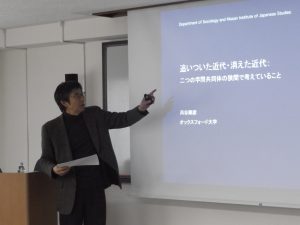
The 19th GJS Lecture "Catching-up Modernity: Reflections in between the two academic communities"
Date and time: March. 27, 2017 (Mon.), 1:00-4:00PM Venue: Main Conference Room (3rd Floor), The Institute for Advanced Studies on Asia, University of Tokyo Speaker: Takehiko Kariya (Professor, University of Oxford) Language: Japanese Report http://gjs.ioc.u-tokyo.ac.jp/en/news/post/20170327_gjs/ Organizer: The Global Japan Studies Network (GJS) Co-organizer: Institute for Advanced Studies on Asia, the University of Tokyo(IASA) Contact: gjs[at]ioc.u-tokyo.ac.jp
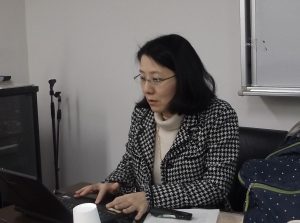
The 17th GJS Lecture Series “Countries for Commercial Relations: The Tokugawa Struggle to Control Chinese in Japan” was held
Report The GJS lecture “Countries for Commercial Relations: The Tokugawa Struggle to Control Chinese in Japan” by Professor Fuyuko Matsukata was held at the First Meeting Room, Institute for Advanced Studies on Asia on Thursday, November 24 . In her lecture, Professor Matsukata discussed the process of how the Tokugawa government categorized the Qing Dynasty as one of the “countries for commercial relations (通商之国)” through a series of events such as the failure to open a diplomatic channel with Ming China, the anti-Christian policy, the Ming-Qing transition, and the rise and fall of Zheng family’s administration in Taiwan. Professor Matsukata also discussed the Tokugawa government’s categorization of the “Chinese (唐人)”
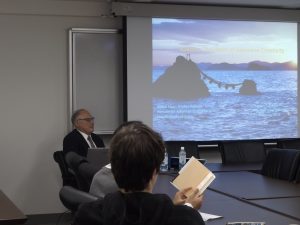
The 16th GJS Lecture Series “Kokoro: The heart of Japanese Creativity” was held
Report The GJS lecture ” Kokoro: The Heart of Japanese Creativity” by Professor Thomas Kasulis was held at the Main Conference Room, Institute for Advanced Studies on Asia on Friday, November 11. In this lecture, Professor Kasulis traced the various sources of the idea of “kokoro” and “xin” (心) from China and ancient Japan, showing how the term accrued a rich array of meanings and nuances. Then he discussed this idea’s role in a general theory of creativity shared by most Japanese spiritual and philosophical traditions. At the end of his exciting lecture, Professor Kasulis showed how in this age of dehumanizing technology, we can find ways to nourish the
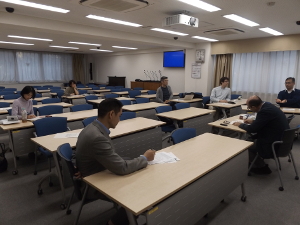
The 15th GJS Lecture Series “Shinto—A Religion of the Signifier?” was held
Report On November 7th, The 15th GJS lecture was held at IASA. Prof. Fabio Rambelli delivered a lecture about his semiotic approach to Shinto, in which symbols(signifier), signifieds, the code (that sets the simbol-signified relation), and the contexts (in which the symbols are interpreted) are analyzed, against the conventional approach that sees the Shinto as national ideology and neglects the elusiveness of Shinto symbols. Using this new approach, professor Rambelli shows that many symbols in Shinto, such as the names of gods and an unbroken line of Imperial House, are actually the “symbolic value zero” (Levi-Strauss), and this elusive nature of the symbols that make various interpretation possible, is actually
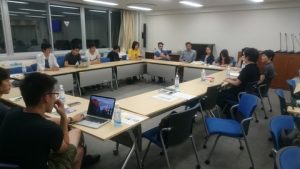
The First Global Japan Studies Summer Program was convened
Report The first Global Japan Studies summer program “An Inquiry into Japan’s Postwar,” sponsored by the Institute for Advanced Studies on Asia and co-sponsored by the Division of International Affairs of the University of Tokyo, was convened from August 24-September 2, 2016. 9 undergraduate students from University of Hong Kong, University of Melbourne, Peking University, Shanghai Jiaotong University, University of Southampton, Leiden University, etc. joined 7 University of Tokyo undergraduate students in participating senior professors’ lectures in the mornings and field trips in the afternoons during the program. Students from overseas also took Japanese language classes. Lively discussions followed each day’s lecture and during field trips students visited the Sensoji
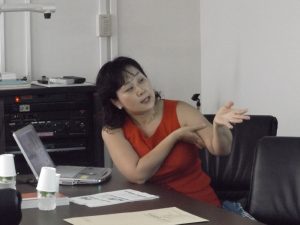
The 13th GJS Lecture Series “The Nanban Sweets and the Trade – from the view of global history”
Report The 13th GJS lecture was held at IASA, the University of Tokyo on July, 7th, 2016. Associate professor Oka delivered a lecture on Nanban trade – trade between Nagasaki and Macao. She argued that as Japanese history merged with a great trends of global history in 16th and 17th century, Nanban trade caused deep social changes in Japan, the traces of which are still visible in our today\’s life. She explained this by picking up some familiar goods as kasutera cake — the name kasutera came from Portugeuse word Castela. After the lecture, many questions were raised from the audience and gave rise to a lively discussion. Picures Information
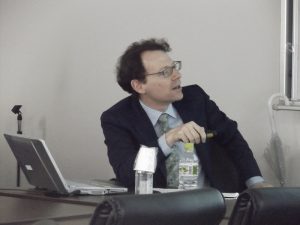
The 12th GJS Lecture “Explaining Japan\’s 50-year Failure to Exploit Its Vast Geothermal Energy Resources”
Report The twelveth Global Japan Studies Lecture was held on June 9, 2016. Jacques Hymans, Associate Professor of the University of Southern California gave a lecture titled “Explaining Japan\’s 50-year failure to exploit its vast geothermal energy resources.” He provided three main obstacles to exploit its vast geothermal energy, which he considered intriguingly a posible way to solve Japan\’s energy insecurity. Following Prof. Hymans\’ talk, a series of questions were raised from the audience and gave rise to a lively discussion. Information Title: Explaining Japan\’s 50-year failure to exploit its vast geothermal energy resources Speaker: Jacques E. C. Hymans, Associate Professor of International Relations, University of Southern California Date and
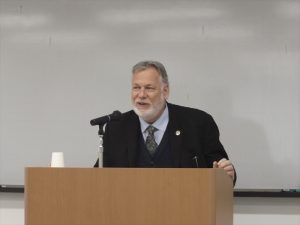
11th GJS Lecture Serie “True Words, True Sounds: Towards a Discontinuous Epistemology in Japanese History”
Report By examining the use, conception and deployment of shingon or “true words” in Japanese history, this paper attempts to define the operation of a “discontinuous structure” which treats the relation between sound, speech and meaning in Japanese history. This paper begins with a presentation of the 17th century work Shikidô Okagami [The Great Mirror of the Way of Eros] and argues for a combinative theory of Eros that includes Buddhism, Shinto and popular social practices. It then expands into a broader discussion of the roles of language and meaning found in this discourse and provides an English translation, and analysis, of one example of the mature form of this
